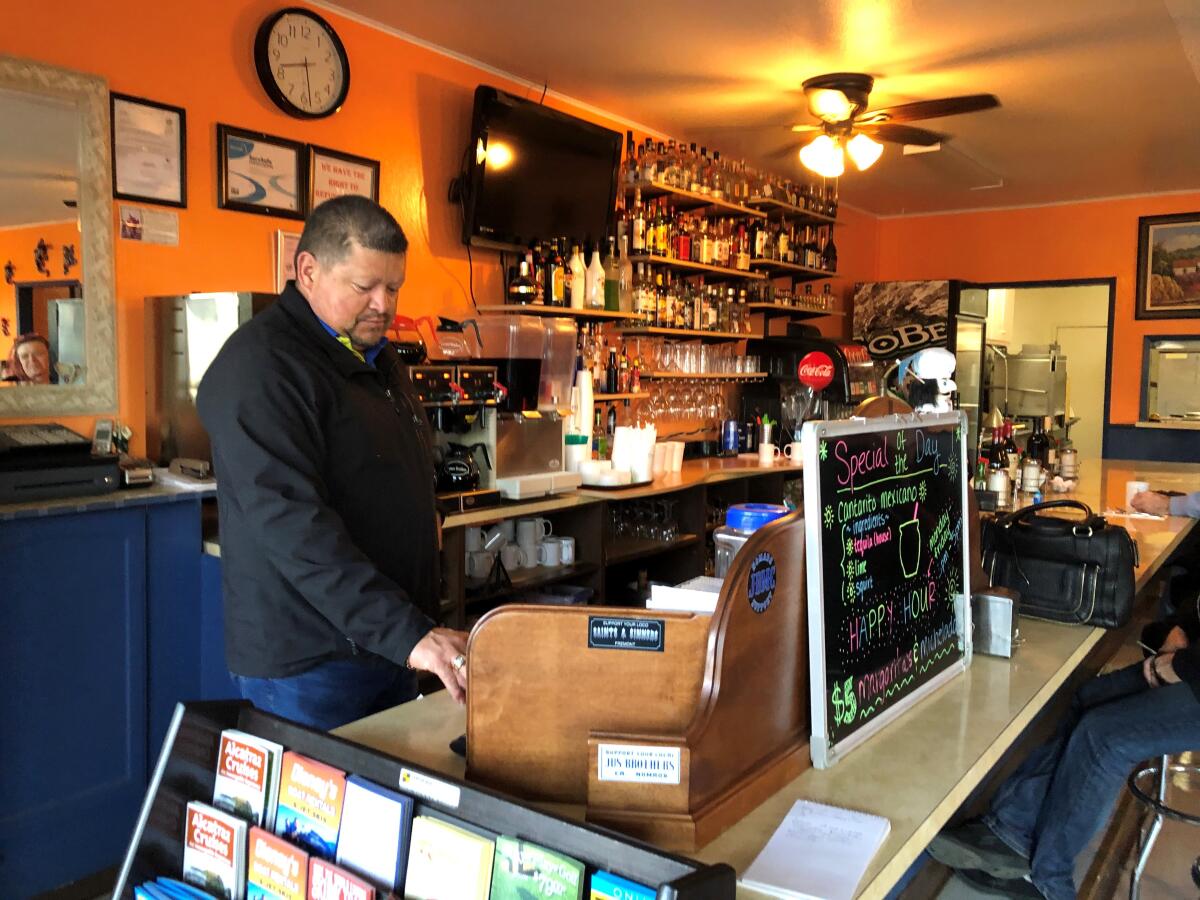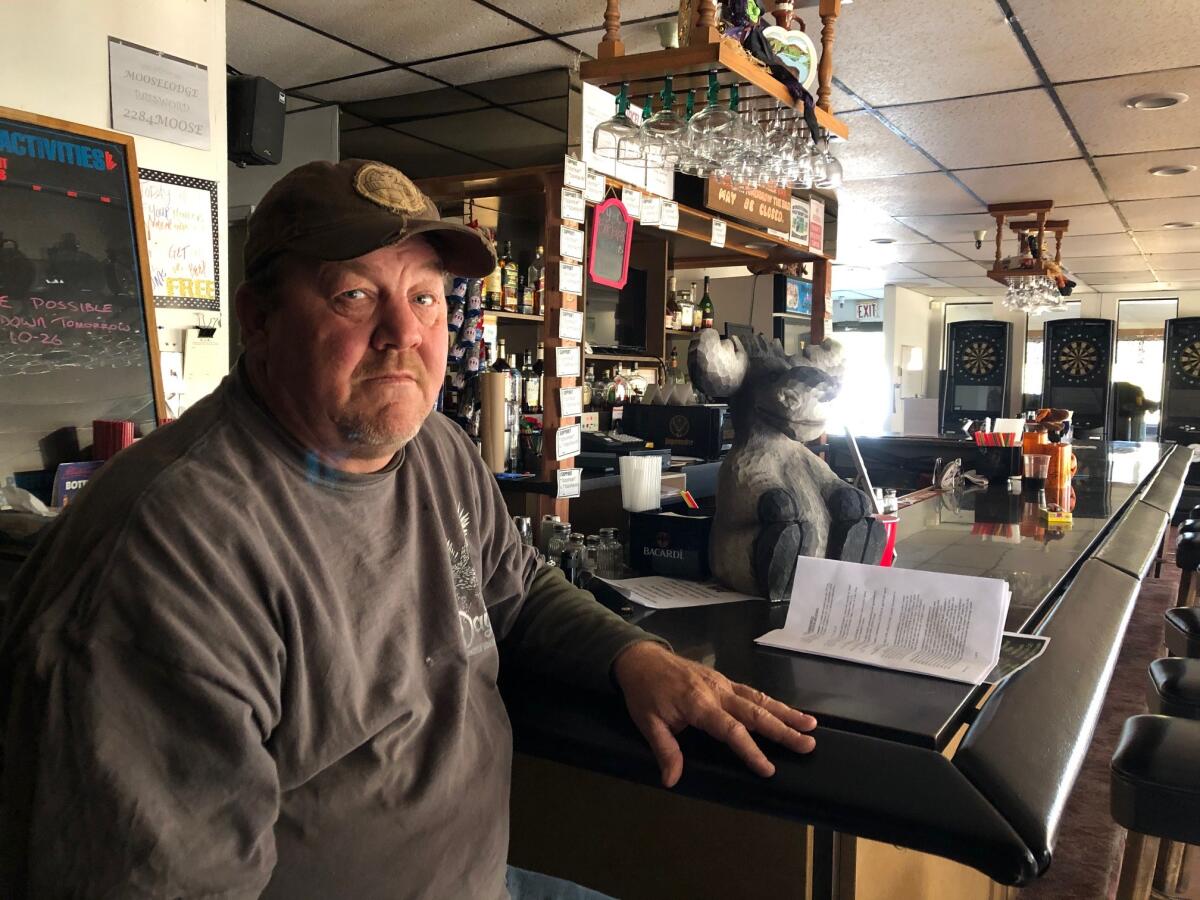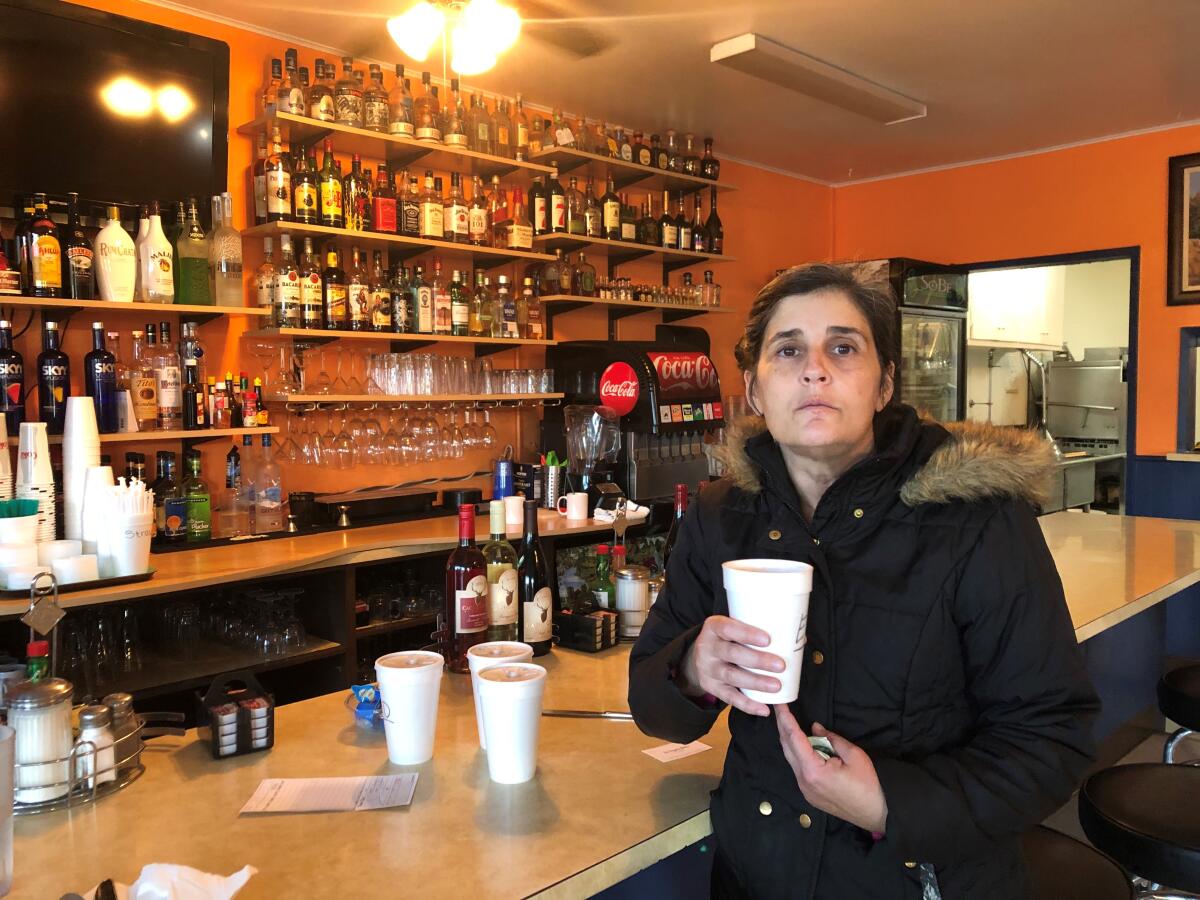Days of terrifying darkness, cold and hunger amid PG&E’s sweeping power blackouts

- Share via
CLEARLAKE, Calif. — For four nights, Eliana Rubin cared for her newborn son, James, by candlelight.
The baby, 11 weeks old, is her first. He’s colicky and wakes often, she said. As the latest Pacific Gas & Electric safety shut-off dragged on this week, she lighted a flame by her bedside each time the child woke, but was careful to blow it out before falling asleep again. Even more than the dark, she worried about the near-freezing temperatures inside her home in this remote part of Northern California.
“The thing is the cold,” she said Tuesday. “I am, like, folding him under the blankets.”
Amid what was effectively the longest planned power shut-off in California, the toll of the blackout — both immediate and existential — took shape Wednesday for PG&E customers who have weathered back-to-back outages, lasting up to five days for nearly half a million people.
In Lake County, which shares a border with Napa County but lacks its wealth, that has meant fear, cold, hunger and often anger — directed at both the utility and state leaders. More than 90% of PG&E customers in this landlocked county of lonely foothills lost power beginning Saturday evening with little idea when it would flow again.
Despite attempts to prepare after a shorter outage earlier this month, the duration of the blackout frayed both tempers and order. Gas tanks were siphoned, and generators “are like diamonds,” said one resident. Cellphones are still sporadic; news remains mostly word of mouth.
Unsure whether Pacific Gas & Electric would keep a promise to restore power by evening, County Administrative Officer Carol Huchingson said Wednesday afternoon she was considering opening emergency shelters for medically fragile residents who have been pushed “completely around the bend.” Worry that outages are the new normal has been replaced by insistence that they cannot be.
“It’s insane,” Huchingson said. “It’s horrible and just totally unacceptable.”
When deep darkness took over by 7 p.m. in the scattered towns around Clear Lake, the largest freshwater lake in the state, there was a “tension in the air,” said resident Susan Blunt, a feeling that although a threat may not be imminent, sunset held a primal menace. The sheriff declared a state of emergency, citing “conditions of extreme peril.”
“Not only are we in the dark, it’s almost like we are completely shut off from the world and that makes it even more terrifying,” said Annette Carter on Tuesday. “I can handle a lot of stuff, but my kids being in fear and not being able to reach out to the world and find out what’s going on ... that’s problematic.”
Carter, who lives on the north end of the lake, is raising three children, including her daughter’s two toddlers. The little ones, she said, were filthy and “all I can do is wash them down with a wash rag.” The blackout made them terrified of the dark, she said, so that she now can’t even close their bedroom door at night.
Carter froze two cases of water before losing power to keep her freezer cold, but it started to melt on the fourth day, which meant lost groceries. She figures she’s already out more than $100, and can’t afford to lose more. She’s an in-home healthcare aide but hasn’t been able to work since the outage. Her husband works at a maintenance yard. It’s going to take her about three weeks to make up lost wages, which means paying rent late, she said.
“Fortunately, I have a really cool landlord and he’s understanding,” she said. “But I think if this continues to go on, he can’t be so understanding.”
PG&E began restoring power shortly after dark on Wednesday and completed the task Thursday. Worn-out residents cleaned up and moved on. Rotten food was double-bagged to keep critters out before being tossed. Neighbors shared social media tips on how to survive the next outage — battery-powered fairy lights in the bathroom, a clever way to brew coffee in the car.
Carter, despite a case of strep throat, helped her kids get ready to trick-or-treat: One dressed as Chase, the German shepard cop-dog from “Paw Patrol,” and the other as a cave girl.
But, like many residents, she said the insecurity doesn’t end with electricity restored.
“They have stolen our peace of mind,” she said. “We’re still reeling.”
Friday is Nov. 1 — when rent is due in this region where most people are paycheck-to-paycheck or on public assistance, and which is described as “California’s ugly stepsister” by resident Gabrielle Brady.
Multiple people who spoke to The Times said the cost of the blackout, including gas, replacing food and lost income, could break them financially. Small-business owners have spent thousands on generators to stay open, and lost thousands more with spoiled inventory and missing sales. The county, one of the most cash-strapped in the state, spent nearly $700,000 on generators and supplies.

Jose Arevalo owns the Country Kitchen restaurant in Clearlake Oaks, a town of about six blocks and 2,000 people along Highway 20. He estimates that after being closed for four days, he could lose more than $10,000.
After the last blackout, he realized he couldn’t afford to be closed that long. It forced him to burn through the savings he had squirreled away for the upcoming slow months. So he hunted down a generator 100 miles away in Yuba City and paid $1,700 for it. It takes about 12 gallons of gas at a time and runs for only six hours. That means he had to come in at 3 a.m. each day or it would shut off and he would lose all his food. But gas became scarce — there were no open stations in town.
“It’s stressful,” he said. “You have to get [money] from somewhere else to continue to pay the bills.”
Almost all in Lake County agree on one thing: They have contempt for Pacific Gas & Electric. Though residents say they understand the need to shut off power for imminent fire threats, they distrust the utility’s methods and motives. They suspect the shut-offs are more about avoiding liability than public safety. Almost everyone has an opinion on what should be done, from breaking up the utility to taking it over.
“Our 11th disaster in four years was brought not by wildfire, not by flood, but by the negligence and abuse of authority of the Pacific Gas & Electric Co. and the California Public Utilities Commission,” county and city leaders wrote Wednesday in a letter to the CPUC.
Many residents said the utility hadn’t been honest or fair, or lived up to its promises about helping residents through the blackouts.

Jerry Gully sat on a bar stool in the dim daylight inside Moose Lodge 2284 on Tuesday, wondering whether he could rig up a generator to pump water from a well. Most wells here are run on electric pumps, which means many people don’t have water. But if he could pump, Gully could flush the toilets, which means he could open the place up as an evacuation center for the Kincade fire.
The lodge, a concrete bunker on a hill with llamas grazing at its base, is normally a thriving social club for its 586 members, mostly seniors who come for cocktails and conversation. But it has also served as a shelter for almost all of the fires that have swept through in recent years, burning more than 60% of Lake County.
It was supposed to be a charging center during the shut-off. On the bar in front of Gully was a signed contract with PG&E outlining the deal. He said the utility never showed up. He’d like some answers for why the aid station never materialized, but can’t find anyone to ask.
“You can’t just throw people back into the Stone Age,” he said. He’s angry the lodge had to sit this disaster out.
“We’ve never missed any type of community necessity,” he said. “PG&E has massively dropped the ball on this stuff.”
Gov. Gavin Newsom is also a target of anger, though he has been vocal in recent days about cracking down on PG&E. The California Public Utilities Commission, which oversees the utility and whose members are appointed by the governor, has launched an investigation into the blackouts. Newsom also pushed for residential customers hit with the shut-offs to receive a $100 credit, a plan the utility at first resisted but has since capitulated on, and announced new aid for outage victims.
But those actions have gained him little favor in Lake County, where President Trump won 43% of the vote to Hillary Clinton’s 47% in 2016, and not much in the way of government help has been seen on the ground yet. Jane King, a friend of Gully’s helping at the lodge, calls it “political yibber yabber.”
A few miles away in a trailer park community, Donald White, a carpenter who previously lived in Redondo Beach, was visiting with a neighbor Wednesday who was sweeping up leaves from the winds that led to the blackout. Both men said they believed taxpayers would ultimately end up paying for the outages, either through increased taxes or raised rates.
“Newsom is a disgrace,” White said. “There’s a lot of people suffering, and Newsom’s there drinking his chardonnay. He’s the chief executive and it all comes from him.”
Though frustration was growing Wednesday, there still was a sense of community and an endurance hardened by isolation.

Denise Serio, an aide at a retirement home that didn’t have a generator, was in Country Kitchen restaurant on Wednesday morning getting coffee for three of her elderly clients. Somebody stole her gas the night before, and she ate a “questionable yogurt” for breakfast, she said. She hadn’t showered in days, had to purchase clean underwear, couldn’t fill a critical prescription and couldn’t pay her rent.
When she tried to go to the PG&E charging station about 10 miles away, “it smelled, and one guy is always trying to talk to me about his dog’s anal glands.”
But her worry was that she couldn’t do very much for her patients.
“I can’t wash their clothes. I can’t wash their dishes,” she said. Instead, she spent extra time just visiting with them. On Wednesday afternoon, she used her dwindling gas to drive one client 30 miles to a town with power to have a hot dinner.
“They are my friends and family,” she said while eating a Philly cheesesteak sandwich in a warm restaurant. “I love these people; they’re wonderful.”
More to Read
Sign up for Essential California
The most important California stories and recommendations in your inbox every morning.
You may occasionally receive promotional content from the Los Angeles Times.











